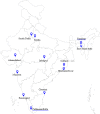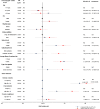Psychological distress and burnout among healthcare worker during COVID-19 pandemic in India-A cross-sectional study
- PMID: 35271652
- PMCID: PMC8912126
- DOI: 10.1371/journal.pone.0264956
Psychological distress and burnout among healthcare worker during COVID-19 pandemic in India-A cross-sectional study
Erratum in
-
Correction: Psychological distress and burnout among healthcare worker during COVID-19 pandemic in India-A cross-sectional study.PLoS One. 2024 Nov 27;19(11):e0314925. doi: 10.1371/journal.pone.0314925. eCollection 2024. PLoS One. 2024. PMID: 39602429 Free PMC article.
Abstract
Background: COVID-19 has inundated the entire world disrupting the lives of millions of people. The pandemic has stressed the healthcare system of India impacting the psychological status and functioning of health care workers. The aim of this study is to determine the burnout levels and factors associated with the risk of psychological distress among healthcare workers (HCW) engaged in the management of COVID 19 in India.
Methods: A cross-sectional study was conducted from 1 September 2020 to 30 November 2020 by telephonic interviews using a web-based Google form. Health facilities and community centres from 12 cities located in 10 states were selected for data collection. Data on socio-demographic and occupation-related variables like age, sex, type of family, income, type of occupation, hours of work and income were obtained was obtained from 967 participants, including doctors, nurses, ambulance drivers, emergency response teams, lab personnel, and others directly involved in COVID 19 patient care. Levels of psychological distress was assessed by the General health Questionnaire -GHQ-5 and levels of burnout was assessed using the ICMR-NIOH Burnout questionnaire. Multivariable logistic regression analysis was performed to identify factors associated with the risk of psychological distress. The third quartile values of the three subscales of burnout viz EE, DP and PA were used to identify burnout profiles of the healthcare workers.
Results: Overall, 52.9% of the participants had the risk of psychological distress that needed further evaluation. Risk of psychological distress was significantly associated with longer hours of work (≥ 8 hours a day) (AOR = 2.38, 95% CI(1.66-3.41), income≥20000(AOR = 1.74, 95% CI, (1.16-2.6); screening of COVID-19 patients (AOR = 1.63 95% CI (1.09-2.46), contact tracing (AOR = 2.05, 95% CI (1.1-3.81), High Emotional exhaustion score (EE ≥16) (AOR = 4.41 95% CI (3.14-6.28) and High Depersonalisation score (DP≥7) (AOR = 1.79, 95% CI (1.28-2.51)). About 4.7% of the HCWs were overextended (EE>18); 6.5% were disengaged (DP>8) and 9.7% HCWs were showing signs of burnout (high on all three dimensions).
Conclusion: The study has identified key factors that could have been likely triggers for psychological distress among healthcare workers who were engaged in management of COVID cases in India. The study also demonstrates the use of GHQ-5 and ICMR-NIOH Burnout questionnaire as important tools to identify persons at risk of psychological distress and occurrence of burnout symptoms respectively. The findings provide useful guide to planning interventions to mitigate mental health problems among HCW in future epidemic/pandemic scenarios in the country.
Conflict of interest statement
The authors have declared that no competing interests exist.
Figures






References
-
- WHO Coronavirus (COVID-19) Dashboard | WHO Coronavirus (COVID-19) Dashboard With Vaccination Data [Internet]. [cited 2021 May 27]. Available from: https://covid19.who.int/
-
- #IndiaFightsCorona COVID-19 in India, Vaccination, Dashboard, Corona Virus Tracker | mygov.in [Internet]. [cited 2021 Jun 12]. Available from: https://www.mygov.in/covid-19
-
- Raj R, Koyalada S, Amit Kumar, Stuti Kumari, Pooja Pani, Nishant KKS. Psychological impact of the COVID‑19 pandemic on healthcare workers in India: An observational study. J Fam Med Prim Care [Internet]. 2020;9:5921–6. Available from: http://www.jfmpc.com/article.asp?issn=2249-4863;year=2017;volume=6;issue... - PMC - PubMed
-
- Sakthivel P, Rajeshwari M, Malhotra N et al.. Violence against doctors: an emerging epidemic amidst COVID-19 pandemic in India. Postgr Med J 2020;01 [Internet]. 2020 [cited 2021 May 27];1. Available from: https://www.indiatoday.in/india/story/chennai- doi: 10.1136/postgradmedj-2020-138925 - DOI - PubMed
Publication types
MeSH terms
LinkOut - more resources
Full Text Sources
Medical
Miscellaneous

